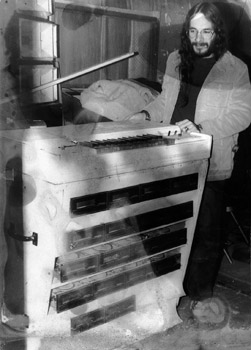Dave Biro had a sound in his head, and it went sort of like this:
Ahhhhh-AHHHHHH-Ahhhhhh
He’d been listening nonstop to a new 8-track, Tales from Topographic Oceans; this was 1974, after all, when a Yes double album of four side-long songs could top the charts. Biro was a hopeful young musician in Connecticut; he’d already spent twelve hundred dollars on a Minimoog a few months earlier, only to find himself out of his day job now. But he still listened to that sound: phantom, hauntingly orchestral washes—and yet not quite an actual orchestra—sweeping like an undercurrent below the impenetrable lyrics of Tales.
He had to get that sound.
But how? It was coming from Rick Wakeman, prog rock’s wizard—the guy even wore a glittering silver cape onstage—and the keyboard Wakeman was playing cost thirty-five hundred dollars new. Biro didn’t have anything near that, and his unemployment checks weren’t going to last forever.
But he could get nineteen automotive 8-track decks from the junkyard for twenty dollars each—and an old piano from a friend, pulling the keys out one by one—and he could stay up thirty-six hours at a time in his father’s garage, working and working—recording, splicing, wiring, cross-fading, figuring out the action of the board, grinding the ivory off the keys to glue in electrical contacts…
“I had no idea what the hell I was doing,” he writes me. “No plans… no drawings… nothing. All I remember is that absolutely no one thought it could work at all.”
One month passed. Then another, and another still. Still he kept working—designing, improvising.
“Rubber bands came in very handy,” he recalls. “So did Radio Shack. I was a daily customer there.”
After working all night, he’d listen to Tales as the sun rose, the track selector on the Stereo 8 coming up to the next track. And then the nineteen other 8-tracks would start, and he’d press a key on his skeletal piano assembly, and then… and then…
KER-CHUNK!
The sound has been in your head too. Cue up David Bowie’s “Space Oddity” to the 1:10 mark—just as Ground Control announces liftoff. There comes an unearthly swell of… flutes? Cellos? It’s Rick Wakeman again, this time on a 1969 Bowie session, and he’s playing the Mellotron: the original analog sampler, a piano cabinet rigged up with tape frames of recorded orchestral instruments. Press a key, and it plays back a specific tape of, say, a middle C# on a cello. The opening flute notes of “Strawberry Fields Forever” are a Mellotron; so are the strings in “The Rain Song” and the choir in “The Lamb Lies Down on...
You have reached your article limit
Sign up for a digital subscription and continue reading all new issues, plus our entire archives, for just $1.50/month.
Already a subscriber? Sign in





